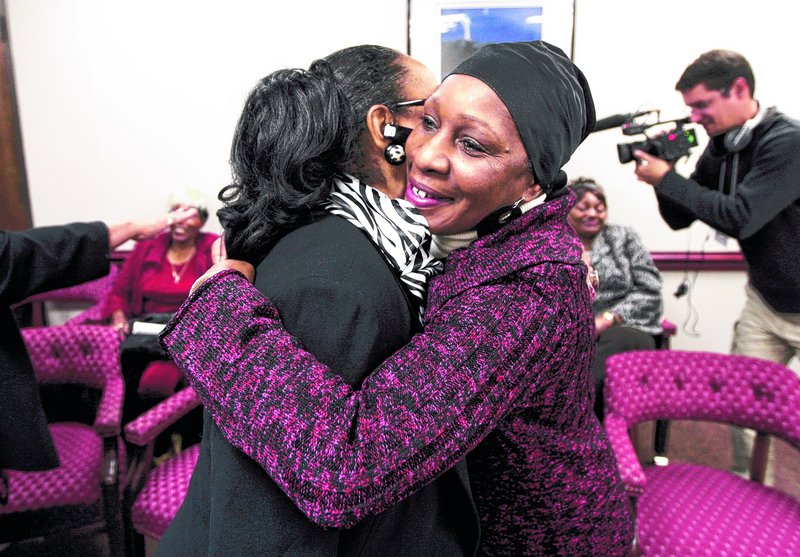RALEIGH, N.C. – Elaine Riddick was a frightened 14-year-old. She was poor and black, the daughter of alcoholic parents in a segregated eastern North Carolina town. And she was pregnant after being raped by a man from her neighborhood.
Riddick’s miserable circumstances attracted the attention of social workers, who referred her case to the state’s Eugenics Board. In a Raleigh office building, five men met to consider her fate — among them the state health director and a lawyer from the attorney general’s office.
Concluding that she was “feebleminded” and doomed to “promiscuity,” board members recommended sterilization. Riddick’s illiterate grandmother, Maggie Woodard, marked an “X” on a consent form.
Hours after Riddick gave birth to a son in Edenton, N.C., on March 5, 1968, a doctor sliced through her fallopian tubes and cauterized them.
“They butchered me like a hog,” recalls Riddick, now 57.
Nearly 44 years later, the state of North Carolina has proposed paying $50,000 each to compensate Riddick and other victims of its eugenics program. It’s the first state to consider compensation for victims of forced sterilization — up to 65,000 in at least 30 states, according to most estimates.
Between 1929 and 1974, nearly 7,600 people were sterilized under orders from North Carolina’s Eugenics Board. Nearly 85 percent were women or girls, some as young as 10. The state estimates that 1,500 to 2,000 of the victims are still alive.
The board’s declared goal was to purify the state’s population by weeding out the mentally ill, diseased, “feebleminded” and others deemed undesirable.
In a 1950 pamphlet, the Human Betterment League of North Carolina said the board was protecting “the community at large,” adding that “you wouldn’t expect a moron to run a train or a feebleminded woman to teach school.”
Riddick has endured a lifetime of humiliation and regret. She can barely control her rage when she discusses what the state did to her — and what the state proposes by way of compensation and apology.
“Fifty thousand dollars?” she says, her voice rising. “Is that what they think my life is worth? How much are the kids I never had worth? How much?”
The $50,000 compensation recommended by the Governor’s Eugenics Compensation Task Force on Jan. 10 must be approved by the state legislature. If so, Riddick said, she will refuse it.
“Fifty thousand dollars isn’t nearly enough to bury my pain,” she says. “It’s shut-up-and-go-away money.”
She pauses, then says: “Am I still bitter? Of course I’m still bitter. The state wants me to lie down like a dog and just take it.”
The traumatic events of 1968 have shaped and driven Riddick’s adult life.
Dirt poor and pregnant, she dropped out of school in the eighth grade. After she gave birth, her son was put in her grandmother’s care, and Riddick was sent to live with an aunt in New York.
At 18, she married a man she met there. When he learned she had been sterilized, Riddick says, he abused her, calling her barren and useless. They later divorced.
Riddick struggled for years to shed the “feebleminded” label stamped on her public health records. She earned a high school equivalency degree and a degree in human services from a technical school in New York. For years, she was an office manager for a tax preparation company.
She traveled regularly to North Carolina to visit her son, Tony, and he went to New York each summer to spend time with her.
But the stigma of her forced sterilization still clings to her. Now remarried and living in Atlanta, she dreads returning home to eastern North Carolina, where everyone knows about her wrecked childhood.
“What must they think, reading what the state wrote about me?” she asks.
From 1929 to 1960, twice as many whites as blacks were sterilized in North Carolina, according to Eugenics Board records. But from 1960 to 1968, twice as many blacks as whites were sterilized.
At 19, Riddick discovered, during a medical examination, what had happened to her. She was devastated, for she had always intended to have several children.
Outraged, she contacted the ACLU in North Carolina, which filed a lawsuit on her behalf in 1974. The suit accused the Eugenics Board, social workers and the local hospital of unlawfully depriving Riddick of her right to bear children.
Riddick became one of the state’s first sterilization victims to go public.
The case dragged on. In 1983, a jury ruled in favor of the defendants. The following year, the U.S. Supreme Court refused to hear Riddick’s appeal.
In 2010, North Carolina Gov. Bev Perdue established the Justice for Sterilization Victims Foundation. Last March, Perdue appointed the compensation task force.
In June, Riddick testified before the task force. She struggled to hold back tears as her son comforted her.
“They slandered me,” she said of the Eugenics Board, which put her IQ at 75. “They ridiculed me and they harassed me.”
A social worker said her grandmother would lose her state food rations if she didn’t sign the consent form, Riddick says.
In a recent interview, Tony Riddick, now an entrepreneur in the county where he was born, said he backs his mother’s intention to refuse $50,000 in compensation.
“It’s a political game, and it’s an insult,” he said.
Send questions/comments to the editors.



Success. Please wait for the page to reload. If the page does not reload within 5 seconds, please refresh the page.
Enter your email and password to access comments.
Hi, to comment on stories you must . This profile is in addition to your subscription and website login.
Already have a commenting profile? .
Invalid username/password.
Please check your email to confirm and complete your registration.
Only subscribers are eligible to post comments. Please subscribe or login first for digital access. Here’s why.
Use the form below to reset your password. When you've submitted your account email, we will send an email with a reset code.